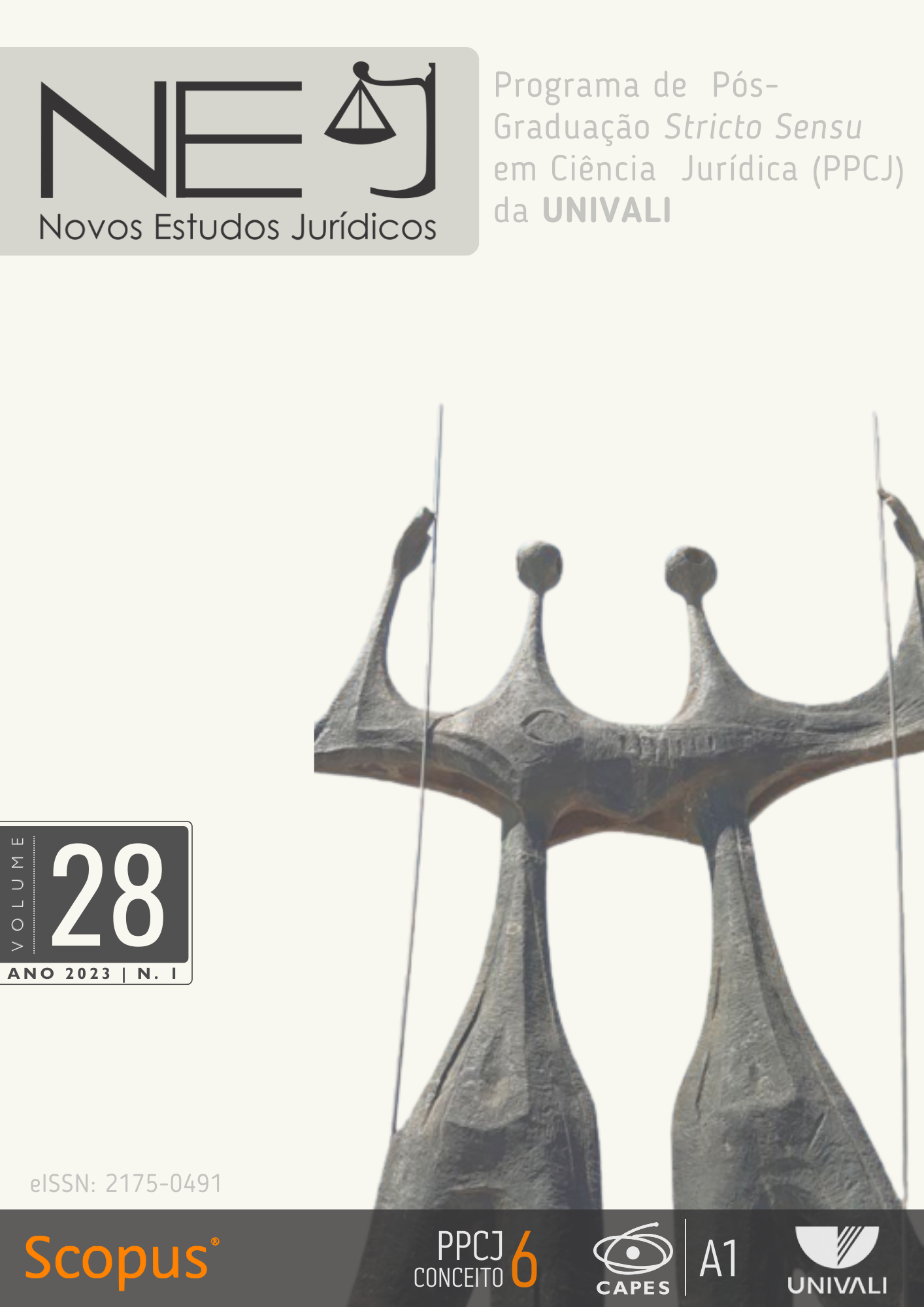LIMITATIONS OF THE FUNDAMENTAL RIGHT TO DATA PROTECTION IN LIGHT OF THE PROBATORY INSTRUCTIONS IN CRIMINAL PROCEEDINGS
DOI:
https://doi.org/10.14210/nej.v28n1.p71-93Keywords:
Fundamental right to data protection, Fundamental right to privacy, Criminal responsibilityAbstract
Contextualization: In the modern society we live, characterized by constant and accelerated technological development, understanding how the right to privacy, intimacy and individual data can be adequately protected is a fundamental issue, particularly when numerous public policies, in the name of social security, have emerged putting those rights at risk.
Objective: To evaluate how the doctrinal and casuistic debate on the tense equations between the fundamental right to personal data protection in the face of criminal prosecution, particularly in Brazil, has developed.
Methodology: It was used, in this research, the deductive method, testing the hypotheses with the general foundations to be outlined and analysis of some jurisprudential cases, as well as the research technique with indirect documentation, namely bibliography.
Results: As a result, it is proposed that the request for personal data stored by internet service providers can be given as long as the elements provided for in Law nº 12.965/2014, in articles 22 and 23, are indicated, namely: a) founded evidence of the occurrence of the offense; b) motivated justification of the usefulness of the request; and c) period to which the records refer, and that their execution also takes into account the dictates of adequacy, necessity and proportionality in a strict sense.
Downloads
References
ALBRECHT, Hans-Jörg. Direito Penal e Periculosidade: a politica criminal entre prevenção, combate a perigos e retribuição de culpa. In MACHADO, Marta R. de Assis e PÜSCHEL, Flavia Portella (org.). Reponsabilidade e Pena no Estado Democrático de Direito. São Paulo: FGV, 2016.
ALEXY, Robert. Teoria dos Direitos Fundamentais. São Paulo: Atlas, 2010.
----. The Construction of Constitutional Rights. In Law & ethics of Human Rights, Volume 4, Issue 1. Article 2. Berkeley: Berkeley Electronic Press, 2010. DOI: https://doi.org/10.2202/1938-2545.1042
BALDASSARRE, Antonio. Diritti della persona e valori costituzionale. Torino: Giappichelli, 1997.
CANARIS, Wilhelm Canaris. Pensamento sistemático e conceito de sistema na ciência do direito. Lisboa: Fundação Calouste Gulbenkian, 1996.
CARVALHO, Márcia Haidée Porto de. A defesa da honra e o direito à informação. Florianópolis: Letras Contemporâneas, 2002.
CERRINA FERONI, Ginevra e MOBIDELLI, Giuseppe. La sicurezza: un valore superprimario. In Percorsi Costituzionale. V.I, nº1/2008, p.39.
COCCO, Giovanni. (a cura di). I diversi volti della sicurezza. Milano: Giuffrè, 2012.
CORTÉS, Raúl Arrieta. El nuevo entorno regulatorio de la protección de datos personales en Chile. Publicado no site https://iapp.org/news/a/el-nuevo-entorno-regulatorio-de-la-proteccion-de-datos-personales-en-chile/, acesso em 14/06/2022.
COSTA Jr., Paulo José da. O Direito de estar só – tutela penal da intimidade. São Paulo: Revista dos Tribunais, 2007.
FEDERAL TRADE COMISSION - FTC. Protecting consumer privacy in an era of rapid change: recommendation for businesses and policymakers, 2012. Acesso pelo site https://www.ftc.gov/sites/default/files/documents/reports/federal-trade-commission-report-protecting-consumer-privacy-era-rapid-change-recommendations/120326privacyreport.pdf, acesso em 14/04/2021.
FRANÇA, Rubens Limongi. Instituições de Direito Civil. São Paulo: Saraiva, 1999.
FROSINI, Tomaso Edoardo. Il diritto costituzionale alla sicurezza. In Forum online di Quaderni Costituzionali, acessado pelo site: https://www.forumcostituzionale.it/wordpress/wpcontent/uploads/pre_2006/440.pdf. Acesso em: 26/05/2021.
GAZZETTA, Cristina. Sicurezza, terrorismo e cittadinanza: la nuova legislazione francese anti-terrorismo e l’impegno Internazionale contro i cd. foreing fighters. In Osservatório sulla normativa, anno V, nº3, 2015.
GOMES, Orlando. Introdução ao Direito Civil. Rio de Janeiro: Forense, 2000.
HODUN, Milozs. Doctrine of implied powers as a judicial tool to build federal polities – comparative study on the doctrine of implied power in the European Union and the United States of America. Islândia: Reykjavik University, 2015, acesso pelo site: https://opinvisindi.is/bitstream/handle/20.500.11815/2479/Doctrine%20of%20implied%20powers%20as%20a%20judicial....pdf?sequence=1&isAllowed=y, acesso em 06/10/2022.
/05/2021.
LAGES, Giniton e RAMOS, Carlos. Quem matou Marielle? São Paulo: Matrix, 2022.
LUÑO, Antonio Henrique Pérez. Derechos Humanos, Estado de Derecho y Constitución. Madrid: Tecnos Ltda, 1999.
MCNEIL, Sonia. Privacy and the modern grid. In Harvard Journal of Law & Technology.V.25 n.1, 2011. DOI: https://doi.org/10.2139/ssrn.1928254
PONTES DE MIRANDA, Francisco Cavalcanti. Tratado de Direito Privado. Direito de Personalidade. Direito de Família. Rio de Janeiro: Borsoi, 1955.
RODOTÀ, Stefano. Privacy, libertà, dignità. In www.garanteprivacy.it, 2004, acesso em 20/08/2022.
ROSA, Alexandre Morais da; DA SILVA, Viviane Ghizoni, e SILVA, Philipe Benoni Melo e. Fishing Expedition e encontro fortuito na busca e na apreensão – Um dilema oculto do processo penal. Florianópolis: EMais, 2022.
RUTUOLO, Marco. Diritto ala sicurezza e sicurezza dei diritti. In Osservatório sulla normativa, anno III, nº2, 2013.
SCHOUCAIR, João Paulo Santos e CAIRES, Luciana Matutino. Ação controlada e sua análise no combate ao crime organizado. In PAULINO, Galtiênio da Cruz, e outros (Org.). Técnicas avançadas de investigação. Brasília: ESMPU, 2021.
WARREN, Samuel D. & BRANDEIS, Louis D. The Right to Privacy. In Harvard Law Review, vol.4, nº5. December 15, 1890. DOI: https://doi.org/10.2307/1321160
www.stj.jus.br/internet_docs/jurisprudencia/jurisprudenciaemteses/Jurisprudência%20em%20teses%20105%20-%20Provas%20no%20Processo%20Penal%20-%20I.pdf, acesso em 11/10/2022.
Downloads
Published
How to Cite
Issue
Section
License
Na qualidade de autor(es) da colaboração, original e inédita, sobre o qual me(nos) responsabilizo(amos) civil e penalmente pelo seu conteúdo, após ter lido as diretrizes para autores, concordado(amos) plenamente com as Políticas Editorias da Revista Novos Estudos Jurídicos - NEJ e autorizo(amos) a publicação na rede mundial de computadores (Internet), permitindo, também, que sua linguagem possa ser reformulada, caso seja necessário, sem que me(nos) seja devido qualquer pagamento a título de direitos autorais, podendo qualquer interessado acessá-lo e/ou reproduzi-lo mediante download, desde que a reprodução e/ou publicação obedeçam as normas da ABNT e tenham a finalidade exclusiva de uso por quem a consulta a título de divulgação da produção acadêmico científico.





























